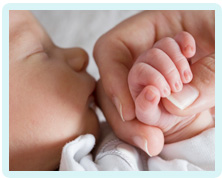
Childbirth Tearing Guide
For 3rd & 4th Degree Tears, please see our separate section here: 3rd & 4th Degree Tears
Despite all of the advances in modern technology childbirth is still a medical procedure that has various risks associated with it, both for the mother and the baby. Childbirth tearing for the mother is one of the more significant risks and complications associated with childbirth. So how does it happen and what treatment can be provided?
How Does Tearing Happen During Childbirth?
A tear occurs quite naturally and unfortunately quite frequently during childbirth. It can be caused by giving birth to a larger than average baby, or simply by the mother having a slight frame. A childbirth tear occurs when the skin is stretched too far and rips or tears during birth. There are several different levels of childbirth tearing depending on the severity of the tear. First and second degree tearing usually cause no long term complications, whereas 3rd degree tears and fourth (4th) degree tears can cause longterm pain and suffering.
Can Childbirth Tearing Be Prevented?
It is possible to prevent tearing if the medical team recognise that it is likely to happen, and rather than having no control over a natural tear they perform an episiotomy (surgical cut). If they do not take this action and you tear 'naturally' there is uncertainty both in terms of the length of the tear and also the depth of the tear (how many layers the tear will cut through).
Childbirth Tearing Complications
The complications will depend upon the length of the tear and the depth of it also. Third and fourth degree tears can lead to ongoing pain and discomfort in the area of the tear, difficulties in visiting the toilet and pain during sexual intercourse.
Treatment Available
Common treatments for severe childbirth tearing include:
- Proper repair by a midwife or surgeon
- antibiotics
- Pain relief
- Pelvic floor exercises
- Appropriate follow up by the hospital
Many people make full recoveries from a childbirth tear.
Claiming Compensation
If there was evidence during birth that you were going to suffer a vaginal tear but no action was taken to prevent it from happening you may well be able to make a claim for medical negligence. Each case will be decided on its own facts, but we have successfully handled many claims for medical negligence arising from childbirth tearing. We offer a free initial appraisal of your case to assess whether you are entitled to make a claim for compensation and to advise you how to make a claim and of the likely consequences.
Funding Your Medical Negligence Claim
We offer No Win No Fee funding for medical negligence claims which we will discuss with you during your free initial telephone discussion.
Make A Free Enquiry Now
If you would like to benefit from a service of excellence with total commitment to client care from a small and friendly team, Glynns are ready and waiting to help you.
Please call us on 0800 234 3300 (or from a mobile 01275 334030) or make a Quick Enquiry now.



